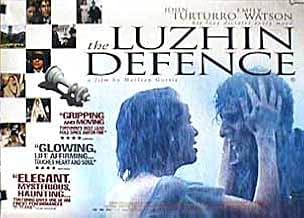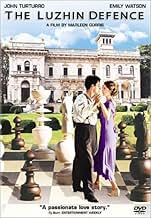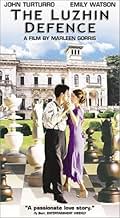IMDb-BEWERTUNG
6,8/10
4947
IHRE BEWERTUNG
Füge eine Handlung in deiner Sprache hinzuTwo worlds collide when an eccentric genius falls in love with a strong-willed society beauty.Two worlds collide when an eccentric genius falls in love with a strong-willed society beauty.Two worlds collide when an eccentric genius falls in love with a strong-willed society beauty.
- Regie
- Drehbuch
- Hauptbesetzung
- Auszeichnungen
- 3 Gewinne & 2 Nominierungen insgesamt
Empfohlene Bewertungen
Obsession comes in many flavors, and exists for a variety of reasons; for some it may be nothing more than a compulsive disorder, but for others it may be an avenue of survival. Lack of nurturing, combined with an inability to negotiate even the simplest necessities of daily life or the basic social requirements, may compel even a genius to enthusiastically embrace that which provides a personal comfort zone. And in extreme cases, the object of that satisfaction may become a manifested obsession, driving that individual on until what began as a means of survival becomes the very impetus of his undoing, and as we discover in `The Luzhin Defence,' directed by Marleen Gorris, a high level of intelligence will not insure a satisfactory resolution to the problem, and in fact, may actually exacerbate the situation. Obsession, it seems, has no prejudice or preference; moreover, it gives no quarter.
At an Italian resort in the 1920's, Alexander Luzhin (John Turturro) is one of many who have gathered there for a chess tournament, the winner of which will be the World Champion. Luzhin is a Master of the game, but he is vulnerable in that chess has long since ceased to be a game to him; rather, it is his obsession, that one thing discovered in childhood that saw him though his total ineptness in seemingly all areas of life, and enabled him to cope with the subtle disenfranchisements of his immediate family. So Luzhin is a genius with an Achilles heel, a flaw which perhaps only one other person knows about and understands, and furthermore realizes can be exploited for his own personal gain at this very tournament. That man is Valentinov (Stuart Wilson), Luzhin's former mentor, who after an absence of some years has suddenly reappeared and made himself known to Luzhin.
Valentinov is an unwelcomed, disconcerting presence to Luzhin, and once again life threatens to overwhelm him. Not only is he about to face a formidable opponent in the tournament, Turati (Fabio Sartor), against whom in a previous match he emerged with a draw after fourteen hours, but he is also attempting to resolve a new element in his life-- his feelings for a young woman he's just met at the resort, Natalia (Emily Watson). And, genius though he may be, dark clouds are gathering above him that just may push Luzhin even deeper into the obsession that has been the saving grace, as well the curse, of his entire life.
To tell Luzhin's story, Gorris effectively uses flashbacks to gradually reveal the elements of his childhood that very quickly led to his obsession with chess. And as his background is established, it affords the insights that allow the audience to more fully understand who Luzhin is and how he got to this point in his life. For the scenes of his childhood, Gorris textures them with an appropriately dark atmosphere and a subtle sense of foreboding that carries on into, and underlies, the present, more pastoral setting of the resort. The transitions through which she weaves the past together with the present are nicely handled, and with the pace Gorris sets it makes for a riveting, yet unrushed presentation that works extremely well. She also underplays the menace produced by the presence of Valentinov, concentrating on the drama rather than the suspense, which ultimately serves to heighten the overall impact of the film, making Luzhin's tragedy all the more believable and unsettling.
The single element that makes this film so memorable, however, is the affecting performance of John Turturro. For this film to work, Luzhin must be absolutely believable; one false or feigned moment would be disastrous, as it would take the viewer out of the story immediately. It doesn't happen, however, and the film does work, because the Luzhin Turturro creates is impeccably honest and true-to-life. He captures Luzhin's genius, as well as his inadequacies, and presents his character in terms that are exceptionally telling and very real. It's a performance equal to, if not surpassing, Geoffrey Rush's portrayal of David Helfgott in `Shine.' And when you compare his work here with other characters he's created, from Sid Lidz in `Unstrung Heroes' to Pete in `O Brother Where Art Thou?' to Al Fountain in `Box of Moonlight,' you realize what an incredible range Turturro has as an actor, and what a remarkable artist he truly is.
As Natalia, Emily Watson is excellent, as well, turning in a fairly reserved performance through which she develops and presents her character quite nicely. Though she has to be somewhat outgoing to relate to Luzhin, Watson manages to do it in an introspective way that is entirely effective. Most importantly, because of the detail she brings to her performance, it makes her accelerated relationship with Luzhin believable and lends total credibility to the story. You have but to look into Watson's eyes to know that the feelings she's conveying are real. It's a terrific bit of work from a talented and gifted actor.
The supporting cast includes Geraldine James (Vera), Christopher Thompson (Stassard), Peter Blythe (Ilya), Orla Brady (Anna), Mark Tandy (Luzhin's Father), Kelly Hunter (Luzhin's Mother), Alexander Hunting (Young Luzhin) and Luigi Petrucci (Santucci). Well crafted and delivered, `The Luzhin Defence' is an emotionally involving film, presented with a restrained compassion that evokes a sense of sorrow and perhaps a reflection upon man's inhumanity to man. We don't need a movie, of course, to tell us that there is cruelty in the world; but we are well served by the medium of the cinema when it reminds us of something we should never forget, inasmuch as we all have the ability to effect positive change, and to make a difference in the lives of those around us. I rate this one 9/10.
At an Italian resort in the 1920's, Alexander Luzhin (John Turturro) is one of many who have gathered there for a chess tournament, the winner of which will be the World Champion. Luzhin is a Master of the game, but he is vulnerable in that chess has long since ceased to be a game to him; rather, it is his obsession, that one thing discovered in childhood that saw him though his total ineptness in seemingly all areas of life, and enabled him to cope with the subtle disenfranchisements of his immediate family. So Luzhin is a genius with an Achilles heel, a flaw which perhaps only one other person knows about and understands, and furthermore realizes can be exploited for his own personal gain at this very tournament. That man is Valentinov (Stuart Wilson), Luzhin's former mentor, who after an absence of some years has suddenly reappeared and made himself known to Luzhin.
Valentinov is an unwelcomed, disconcerting presence to Luzhin, and once again life threatens to overwhelm him. Not only is he about to face a formidable opponent in the tournament, Turati (Fabio Sartor), against whom in a previous match he emerged with a draw after fourteen hours, but he is also attempting to resolve a new element in his life-- his feelings for a young woman he's just met at the resort, Natalia (Emily Watson). And, genius though he may be, dark clouds are gathering above him that just may push Luzhin even deeper into the obsession that has been the saving grace, as well the curse, of his entire life.
To tell Luzhin's story, Gorris effectively uses flashbacks to gradually reveal the elements of his childhood that very quickly led to his obsession with chess. And as his background is established, it affords the insights that allow the audience to more fully understand who Luzhin is and how he got to this point in his life. For the scenes of his childhood, Gorris textures them with an appropriately dark atmosphere and a subtle sense of foreboding that carries on into, and underlies, the present, more pastoral setting of the resort. The transitions through which she weaves the past together with the present are nicely handled, and with the pace Gorris sets it makes for a riveting, yet unrushed presentation that works extremely well. She also underplays the menace produced by the presence of Valentinov, concentrating on the drama rather than the suspense, which ultimately serves to heighten the overall impact of the film, making Luzhin's tragedy all the more believable and unsettling.
The single element that makes this film so memorable, however, is the affecting performance of John Turturro. For this film to work, Luzhin must be absolutely believable; one false or feigned moment would be disastrous, as it would take the viewer out of the story immediately. It doesn't happen, however, and the film does work, because the Luzhin Turturro creates is impeccably honest and true-to-life. He captures Luzhin's genius, as well as his inadequacies, and presents his character in terms that are exceptionally telling and very real. It's a performance equal to, if not surpassing, Geoffrey Rush's portrayal of David Helfgott in `Shine.' And when you compare his work here with other characters he's created, from Sid Lidz in `Unstrung Heroes' to Pete in `O Brother Where Art Thou?' to Al Fountain in `Box of Moonlight,' you realize what an incredible range Turturro has as an actor, and what a remarkable artist he truly is.
As Natalia, Emily Watson is excellent, as well, turning in a fairly reserved performance through which she develops and presents her character quite nicely. Though she has to be somewhat outgoing to relate to Luzhin, Watson manages to do it in an introspective way that is entirely effective. Most importantly, because of the detail she brings to her performance, it makes her accelerated relationship with Luzhin believable and lends total credibility to the story. You have but to look into Watson's eyes to know that the feelings she's conveying are real. It's a terrific bit of work from a talented and gifted actor.
The supporting cast includes Geraldine James (Vera), Christopher Thompson (Stassard), Peter Blythe (Ilya), Orla Brady (Anna), Mark Tandy (Luzhin's Father), Kelly Hunter (Luzhin's Mother), Alexander Hunting (Young Luzhin) and Luigi Petrucci (Santucci). Well crafted and delivered, `The Luzhin Defence' is an emotionally involving film, presented with a restrained compassion that evokes a sense of sorrow and perhaps a reflection upon man's inhumanity to man. We don't need a movie, of course, to tell us that there is cruelty in the world; but we are well served by the medium of the cinema when it reminds us of something we should never forget, inasmuch as we all have the ability to effect positive change, and to make a difference in the lives of those around us. I rate this one 9/10.
Part of the enjoyment that I took from this film stemmed from the fact that I knew nothing more about it than that it starred John Turturro and Emily Watson (2 reasons enough to watch), was a period piece and involved chess. Everything that evolved before me was completely unexpected. I shan't, therefore, give away much more. Suffice to say that Turturro is magnificent as an eccentric, obsessive and deeply vulnerable chess genius and Em matches him step for step as the strong-minded woman who is drawn to him. It's about love and obsession, rather than the venerated board game and after drawing me in gradually over the first half hour, became totally compelling. And I defy anyone to second-guess the ending.
'The Luzhin Defence' is a movie worthy of anyone's time. it is a brooding, intense film, and kept my attention the entire time. John Turturro is absolutely stunning in his portrayal of a tender, eccentric chess Grandmaster, and Emily Watson is spell-binding as the gentle but rebellious daughter of a highly respected Russian family. The chemistry between Watson and Turturro on screen is obvious from the moment their characters meet in the story. All in all, this movie is one of the best in-depth looks at the life of a chess Grandmaster, and Turturro and Watson add a whole non-mainstream, non-cliche feel to the film. Most people will come out of the theater thinking, and feeling somewhat touched by this brilliant look at the most unlikely of love stories.
Alexandr "Sascha" Luzhin (John Turturro) is a former leading chess player attempting a comeback at an Italy-hosted tournament. His brilliance is unquestioned but his obsession with chess has stunted his growth in all other aspects of his life. Natalia (Emily Watson) is a beautiful heiress who has come to the same resort with her mother, Vera (Geraldine James) to scope out possible marriage partners. Vera leans toward a handsome count but, astonishingly, Natalia is more fascinated by Sascha, whom she met on a walk. Sascha, too, is taken with Natalia and proposes marriage at their second meeting. But, with the concentration that Sascha must give to the chess matches and, with other happenings in his past still causing problems, will he win the heart of Natalia? Oh, and can he become the chess champion, also? This is a lovely film, based on a novel by Nabokov. The acting is amazing, with Watson very fine as the beautiful little rich girl and Turturro utter perfection as the shy, awkward chess enthusiast. James gives quite a nice turn as the overbearing mother and the other cast members are wonderful as well. As for the look of the film, it could not be better. The scenery is of the put-your-eye-out variety, the vintage costumes are gorgeous and the cinematography is deserving of much applause. Yes, the story is unusual and told with the use of flashbacks, at times, making it a film not everyone will appreciate. Then, too, the ending is bittersweet. However, if you love romance, period pieces, great acting, knockout scenery, or the fine art of motion picture creation, don't miss this one. You will be defenseless in resisting its multitude of charms.
John Turturro, Emily Watson, Geraldine James, Stuart Wilson; directed by Marleen Gorris, loosely based on the novel by Vladimir Nabokov The Luzhin Defence is set in nineteen-twenties Italy's lake district where the world championships of Chess are being staged. Our hero Luzhin (Turturro) is a main contender for the title and recognized as one of the greatest chess minds of the era. He is utterly consumed by game, and has utterly devoted his life to the contest since a young age. It has been both obsession and addiction for the man, as it is both all he knows and what gives his life meaning. While competing in the championships, he meets Natalia (Watson), a wealthy socialite. Showing his peculiarity, he immediately asks her to marry him, sight unseen. Intrigued by his straight forward manner, she does not immediately dismiss him.
This is due to the fact that she is here for her mother to choose a suitor for her, and Luzhin's eccentricity is seen by her as a welcome change. Her mother (James) is completely taken aback by such an idea, and wants her daughter to marry someone of similar prestige and means. All of this transpires while his old chess teacher (Wilson) tutors his chief rival, wanting nothing more than to see Luzhin humiliated.
Being a chess movie, it could immediately be set aside as dull and unwatchable, being as Chess is not exactly a spectator sport.
However, this movie is much less about chess and much more about the people surrounding the game; making it a piece about the interactions of personalities and not pieces. The movie does find a parallel however, as it is shown like a chess match between two sides, the present and the past (shown through flashbacks), with one side prevailing at the end. This storytelling choice works surprisingly well, as we gain much insight as to why Luzhin is the way he is, and how he views the world.
The movie begins with a telling piece of cinematography, as the audience is given the perspective of a train conductor emerging from a tunnel. This is especially significant when viewed in the sense of Luzhin's later mental breakdown, and can be seen as meaning the same thing. This scene is then segued into the first flashback, giving us a pattern that can be seen in the rest of the film. Other notable scenes include the meeting of Natlalia and Alexander at a tennis court, and later when he is thinking to himself in their bedroom, "There is a pattern emerging!" cries the eccentric chess genius Alexander Luzhin. "I must keep track--every second!" To which Natalia, whom he loves can only reply, "It sounds like such a lonely battle.' This all encompassing effect of chess on him can also be seen earlier in the film, as he is being driven by one of his old chess teachers chauffeurs into the middle of the countryside, is dropped off there, and does not notice. The end adds character to the film without being overly dramatic, but is a departure from the finish of the novel, however it is believable and adds to the sense that Luzhin does not really control himself, or know how.
Overall an enjoying piece of film, more about camera angles and people then chess. After the first half, the films pace drastically speeds up, and the plot becomes much more intriguing. Can best be compared to other independent films of its ilk, yet also suffices quite well as a period piece. Probably not a buy, but a worthy rental for an evening at home.
This is due to the fact that she is here for her mother to choose a suitor for her, and Luzhin's eccentricity is seen by her as a welcome change. Her mother (James) is completely taken aback by such an idea, and wants her daughter to marry someone of similar prestige and means. All of this transpires while his old chess teacher (Wilson) tutors his chief rival, wanting nothing more than to see Luzhin humiliated.
Being a chess movie, it could immediately be set aside as dull and unwatchable, being as Chess is not exactly a spectator sport.
However, this movie is much less about chess and much more about the people surrounding the game; making it a piece about the interactions of personalities and not pieces. The movie does find a parallel however, as it is shown like a chess match between two sides, the present and the past (shown through flashbacks), with one side prevailing at the end. This storytelling choice works surprisingly well, as we gain much insight as to why Luzhin is the way he is, and how he views the world.
The movie begins with a telling piece of cinematography, as the audience is given the perspective of a train conductor emerging from a tunnel. This is especially significant when viewed in the sense of Luzhin's later mental breakdown, and can be seen as meaning the same thing. This scene is then segued into the first flashback, giving us a pattern that can be seen in the rest of the film. Other notable scenes include the meeting of Natlalia and Alexander at a tennis court, and later when he is thinking to himself in their bedroom, "There is a pattern emerging!" cries the eccentric chess genius Alexander Luzhin. "I must keep track--every second!" To which Natalia, whom he loves can only reply, "It sounds like such a lonely battle.' This all encompassing effect of chess on him can also be seen earlier in the film, as he is being driven by one of his old chess teachers chauffeurs into the middle of the countryside, is dropped off there, and does not notice. The end adds character to the film without being overly dramatic, but is a departure from the finish of the novel, however it is believable and adds to the sense that Luzhin does not really control himself, or know how.
Overall an enjoying piece of film, more about camera angles and people then chess. After the first half, the films pace drastically speeds up, and the plot becomes much more intriguing. Can best be compared to other independent films of its ilk, yet also suffices quite well as a period piece. Probably not a buy, but a worthy rental for an evening at home.
Wusstest du schon
- WissenswertesLushins Verteidigung (2000) was shot entirely in Europe. Budapest, Hungary was used for outdoor scenes as they were set in St Petersburg, these included the Széchenyi Chain Bridge, Hungarian National Museum and Heroes' Square. The chess tournament (although in Italy) was shot inside the main hall of the Museum of Ethnography, Budapest. In Italy, the hotel scenes were filmed at Villa Erba, Cernobbio, on the Lake Como. The scene at the railway station is in Brenna-Alzate, near Como.
- PatzerIn his game as white against an unnamed opponent before the final, Luzhin is shown supposedly checkmating with Rd1-d8, which is an illegal move because his rook at d1 is pinned against his king on h1 by black's rook at c1.
- Zitate
Aleksandr Ivanovich Luzhin: There's a pattern emerging, a definite pattern. Not Turati. I repeat that game. I've beaten him. And his moves are repeated, repeated, repeated moves. I must keep track... of every second. Every second I must keep track of, every second.
Natalia Katkov: It sounds like such a lonely battle.
- SoundtracksJazz Suite No. 2: VI. Waltz 2
Written by Dmitri Shostakovich (as Dimitri Shostakovich)
Performed by Koninklijk Concertgebouworkest (as Royal Concertgebouw Orchestra)
Conducted by Riccardo Chailly
By permission of Boosey & Hawkes Licensing
Courtesy of Decca Record Label Ltd.
Under license from Universal Special Markets
(p) 1992 Decca Records
Top-Auswahl
Melde dich zum Bewerten an und greife auf die Watchlist für personalisierte Empfehlungen zu.
- How long is The Luzhin Defence?Powered by Alexa
Details
- Erscheinungsdatum
- Herkunftsländer
- Sprachen
- Auch bekannt als
- The Luzhin Defence
- Drehorte
- Budapest, Ungarn(St Petersburg scenes)
- Produktionsfirmen
- Weitere beteiligte Unternehmen bei IMDbPro anzeigen
Box Office
- Bruttoertrag in den USA und Kanada
- 1.053.070 $
- Eröffnungswochenende in den USA und in Kanada
- 63.203 $
- 22. Apr. 2001
- Weltweiter Bruttoertrag
- 1.873.620 $
- Laufzeit1 Stunde 49 Minuten
- Farbe
- Sound-Mix
- Seitenverhältnis
- 1.85 : 1
Zu dieser Seite beitragen
Bearbeitung vorschlagen oder fehlenden Inhalt hinzufügen

Oberste Lücke
By what name was Lushins Verteidigung (2000) officially released in India in English?
Antwort





























